#with some coincidentally appropriate activities/obsessions
Explore tagged Tumblr posts
Text
My tuilips etc!!!!
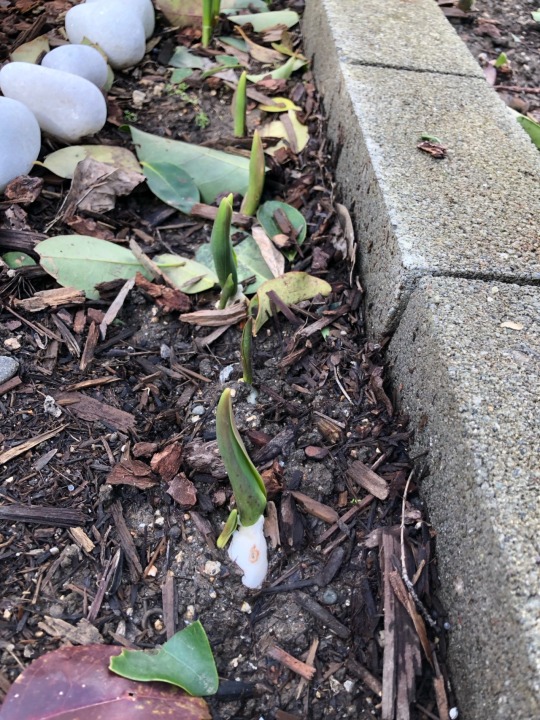
#plants#tulips#gardening#the rain keeps partially unearthing folks#anthesteria#me: doesnt remember when it is#but always manages to stumble into the vibe#haphazardly#with some coincidentally appropriate activities/obsessions#spring is coming!!!
13 notes
·
View notes
Text
When the G0lden C0rral burned down. (Edit: By the way, I am completely serious about the town’s appreciation for G0lden C0rral, and fighting hard to install a Chil!’s, and being deliriously in love with @pplebee’s to the point of writing letters to the editor about the joy of happy hour deals. And I definitely remember one woman did explicitly mention @pplebee’s in the context of “why we need a Chil!’s.” These events took place in years before the internet eventually targeted those franchises as the punchline of jokes about the dying of quintessential Middle America iconography and “tradition.” So, looking back, it seems like an eerily-appropriate hallucinogenic vision of the decline of Americana, custom-made to service mid-2010s jokes.)
When I was in high school, the staff received news that the town’s local G0lden C0rral buffet was currently on fire and might be destroyed, and this was evidently a big deal because this town was dying, and everyone was painfully aware of the fact. And the town had obsessive, truly obsessive, nostalgia for its heyday in the 1940s, when they had become vain, intoxicated by money from coal, natural gas, the US military, and corporate monoculture growing grains for expanding 1950s cereal brands. But by the time of the fire at the restaurant, all of that was gone, over, done. A sadness hung over the town. The major events reported in the paper in the recent decades were: UFO sightings, businesses closing, more UFO sightings, racist assaults, drunk driving accidents, and gruesome murders. People got off work, drove (speeding through residential roadways) directly home, locked their door, made sure blinds were closed. (To this day, when I meet people also from that area, they will offer unsolicited comments about their relief for having escaped “the black hole.”) And so at various restaurants and business and homes across town, there often hung black-and-white photos of “the Good Days” and the polished cobblestone walkways of the still-living downtown district. (Meanwhile smoke rose from the campfires at the shantytown on the hillside, where “non-desirables” were sentenced to live. One time, at a small art museum, I saw a photo of a wealthy white couple in the 1950s, very well-dressed, taken outside of a fine restaurant, and the columns of smoke. I asked one of the museum curators about it. She said “oh, that’s where the Native people lived” because the city wouldn’t lend or rent to them.) And so the town cherished gaudy mid-20th-century Americana, and they couldn’t bear to lose a G0lden C0rral.
I biked everywhere, all day, though I did have a vehicle. They shouted slurs at me all the time, and I had full beer cans and liquor bottles thrown at me by vehicle drivers multiple times for having the audacity to ride a bike. The year after the fire, when the town was offered “free” financial assistance from the state to install bike lanes, at a public comment session, there was a line so long it extended out the door of the city council office. People had all kinds of antisemitic and strange violent things to say about how “the Californians want us to install bike lanes” and “the New World Order is trying to impose this hippie bullshit” and “it’s a plot against coal and oil and gas to diminish vehicle use.” I’m dead serious, those comments were recorded in the paper. Around that same time, the town was also deciding what to do with a nice empty lot in the only relatively successful commercial center. The options were: (1) Install a complex with a locally-owned taqueria, a bistro using produce only from local farms, and some other quaint business. Or (2) bring in a Chil!’s franchise. People were stoked about the potential for a Chil!’s. It was a Big Deal. Once again, and I am not making this up, the line at the public comment session was so long that it stretched out the door. After many angry comments (again, not making this up), the town chose to install the Chil!’s, with at least one article in the paper quoting someone who advocated for the Chil!’s because the local @pplebee’s had recently ended some deals and began closing earlier.
During the same year period as the fire at the buffet, I had been sitting at a pleasant neighborhood park when multiple cop cars showed up, suddenly. Cops swarmed a pick-up truck, with shotguns aimed directly at the head of a teenager, high school student. More than 10 cops, all guns drawn. I was sitting 3 meters away. I immediately asked one cop if I could leave, and they told me “no,” and so I got to witness the dialogue. The cops had tracked these kids, hunted them down, because they threw a plastic Peps! bottle out of their window earlier that afternoon, but they made the mistake of doing it in the wealthy neighborhood. And so a woman thought the bottle might have been made out of glass, and therefore “threatened the life of her dog” (if the dog ingested glass I guess?). She immediately called the cops, hence the military occupation of this nice little park, and that was the excuse for terrifying these kids with the shotguns. Coincidentally, the G0lden C0rral itself was only a few blocks from where a younger me had watched the draining and destruction of my favorite vernal pool and frog pond. So I had despised development, the destruction of the prairie, and the Hallmark-Card-wannabe posturing of the town for years, always disturbed by the horrible violent past (and present), etc. Had been repeatedly talked to by school district administrators and “concerned parents” of fellow students and “ex-friends” for activism and related “political stunts” from the time I was like 13 onward. And after spending years in this place, watching the town destroy all the native prairie for Chil!’s franchises and watching the townsfolk yell about the Jewish plot to install bike lanes to defeat the Beloved Gas Industry, I was ready to witness what fate had in store for this classic buffet franchise.
So when news came of the fire at G0lden C0rral, I stood up, and straight-up walked out of the room. Skipped class. Got in my vehicle. Drove directly to the burning building.
Firefighters had set up a perimiter, so I parked as close as possible. (About 50 meters or so.) I was sipping loose-leaf tea from an insulated water bottle. And the place did burn down. The firefighters had apparently determined that there was no salvaging the place, and so they let the fire take its course. It took about 30 minutes, but the fire eventually reached gas lines in the kitchen, and there was big explosion, and some glass panels blew out while part of the roof erupted into smoldering wooden shards.
It was a sunny day. Immediately afterwards, I went home and took a nap. I slept well. Moved away from that place within a year.
138 notes
·
View notes
Text
Behind Every Pop Sensation
On Aug 20th, world-famous K-pop boy group, BTS, premiered the music video to their latest single, “Dynamite”, on YouTube. According to Forbes, the premiere garnered the attention of around 3 to 4 million viewers, making the group the record holder of the most viewed debut on YouTube’s history. That record was previously held by fellow K-pop act, BLACKPINK, with the music video for their pre-release single, “How You Like That”, which gathered 1.65 million initial views.
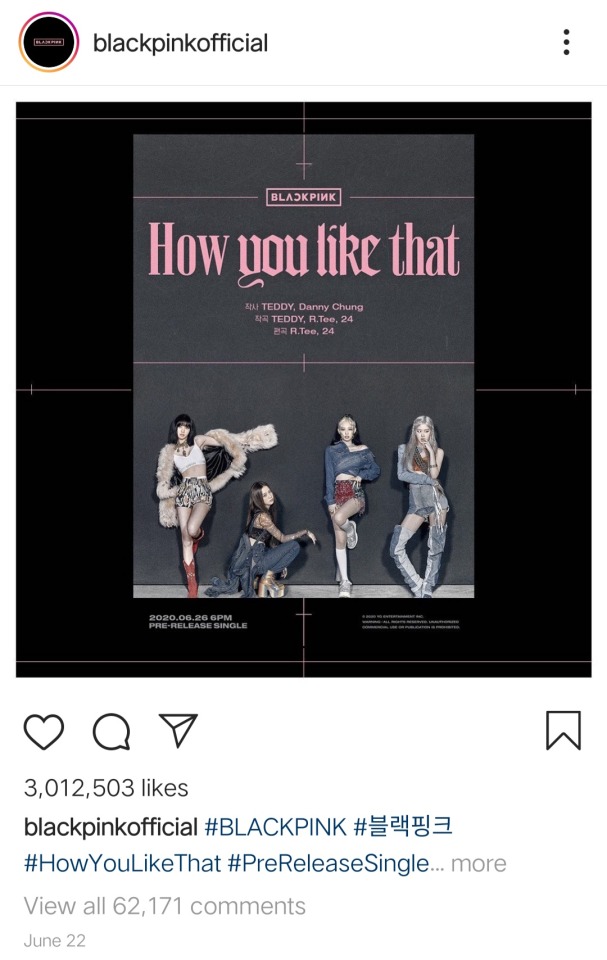
Source: Instagram @blackpinkofficial
With such impressive achievements overtaking one another, it is undeniable that the influence and popularity of K-pop is thriving. For the average person, the success of the many K-pop groups nowadays may seem rather unannounced. Seeing K-pop groups dominating and making history on both Korean and international charts and headlines, some of us may be curious about the phenomenon’s start.
While not as popular, the K-pop scene has always been around, with senior artists such as BoA, Rain, and Lee Hyori leading the spotlight. These are the pioneers that inspired the later generations of K-pop idols and groups such as Big Bang, Wonder Girls, and SNSD. One of these groups, being the first girl group from Asia to achieve over 100 million views on multiple music videos, would later earn the title of South Korea’s “Nation’s Girl Group”.

Source: SM Entertainment
Coincidentally, it was none other than the Nation’s Girl Group themselves that introduced me into K-pop. I was captivated by the image that surrounded the K-pop culture: the perfectly synchronized dance choreography, the fancy stage outfits, the embellished stages, the displays of friendship and bond between members of a group, and the adoration from fans. I was Alice, and K-pop was Wonderland. However, as I went deeper down the rabbit hole, the perfection slowly crumbled away. Piece by piece, I discovered all the awful things that happened behind the scenes: mistreatments, involvements in illegal activities, lack of care by agencies, obsessive fans and more. Behind the glitz and glamour captured on stage and cameras lie issues that many fans may not immediately realize.
Now that K-pop is at its height, I think it is appropriate to shine some light on both the good and the bad in K-pop. For a lot of fans, K-pop may be a form of escape and comfort, but it is important for us to know what we are supporting. We need to be critical of the things that we consume and enjoy. Being a fan of something doesn’t mean that you can’t point out its flaw, nor that you agree with everything that it represents. Whether you’re reading this blog just for the “tea”, or hoping to learn something, please remember to take everything with a grain of salt.
Sources: (1) (2) (3) (4) (5)
1 note
·
View note
Text
My Hero Academia Chapter 257 Review
youtube
The big war draws near; unless this is manga in which it is. Therefore, it can skip time and before you know it, we’re here. Essentially, this chapter became the calm before storm. Based on the developments, this arc is set out to be the biggest one yet. I am excited and worried for what comes next.
Picking up from the last chapter, Deku is given a notebook with collected data based on the previous One for All users; all except second and third. I believe they’re the ones with silhouette only back when Deku was greeted by the original One for All. For some reason, they’re not in the record, so the mystery remain up in the air. All the more reason to believe this arc isn’t the last.
The Fifth user and the original inheritor of Blackwhip is finally named. Daigoro Banjo, who goes by the hero name, Lariat. This will end the trend of calling him Hellboy. Bakugo calls the heroes from the data bunch of nobodies. While that’s a rude comment, he’s not wrong according to All Might.
The ideal is the user isn’t exactly special, rather it’s the Quirk that’s special. It is what All for One was obsessed with. The mantle of the Quirk is designed to pass it down, finding the fitting hero to put it an end to evil. In other words, these heroes weren’t chosen ones; the Quirk is what made them to be the one. It’s similar to Deku; a boy who didn’t have a Quirk, now wield one and suddenly became the one. Like the philosophy of championship, the title don’t make the man, though in this case, it’s reversed. Deku got super lucky with Sage of Six Quirks, but I digress.
The next one in line to unlock is the ability to float. It came from Nana herself. I like the panel shot with her. I would make fun of Ochaco for becoming irrelevant, but it is far too soon. Though it reminded me of how Naruto made medics useless. Funny, because I was fine with the way Deku “floated” back against Overhaul. On the other hand, he did say he can only use Blackwhip for a second, so he won’t float perfectly from the get-go. One thing is certain, Studio Bones will be happy for more over-the-top action.
I have to say, Bakugo was rather annoying here. I know some fans don’t like his constant yelling, but I thought in here, I find it inexcusable. I laughed at the useless part, despite being rude, but the rest kept harming the flow of narrative. It’s only appropriate when he goes into rival mode against Deku. Acting all high and mighty that he can fly already. I suppose we’re getting ready to Dragon Ball the hell out of it. Oh well, the rivalry rolls on and that put a smile on All Might’s face.
Deku and Bakugo return to the campus for some hot pot party. Kind of odd to see it double time of party with the class within an arc that hasn’t gone through the climax or anything. Even so, I’ll take it. I did state that coincidentally, the big war lands before the new term for the students. Basically, it’s either win and enter the new term alas a new year, or lose and the school is over. Saying option two out loud sounds pretty fine.
Everyone gather around and grab some grubs, looking forward to when they become second-years. All I can say is, it’s about time. Everyone is enjoying, while Deku thinks to himself how much he’s blessed to be in U.A. I would like to think this is a death flag, but I don’t buy with lack of past tensions for them. That being said, it is nice to know how he feels about his time with U.A. I just wish for stronger focus on the students. Maybe next term.
The death flag signal that I can buy in is the adults. Case in point, All Might and Aizawa have a chat about being helpful. All Might wishes he can do more for the students and everyone. He’s fine remaining alive, but powerless to do anything is what’s killing him. Aizawa reassures him that being around is helpful enough. Him as a beloved hero, active or not, is what will drive everyone, and that’s all they needed.
This part I like, knowing their relationship as a whole. It’s neat for a bitter friend to help out a man with diminishing pride. This raise a death flag for All Might, especially this arc is set to be grand. Not saying Kohei-sensei should pull the trigger to make it better, but something need to be done to wake up the series. Before anyone would suggest for more training or character development, a time-skip happens. Skipping to March, the day of reckoning is almost here, but with no heroes in sight.
Part of me is skeptical with the sudden time-skip. I did predict it, but it appears it skipped to the opening stage, rather than the pre-show phase. Meaning the action is about to kick-off. That or something else has happened. I doubt Shigaraki has eliminated everyone already. Also, the doctor is there, who I believe it’s Ujiko. The setup looks ready for war. The one part that I am more worried is the excuse to use multiple flashbacks and time it for convenient turnaround, mainly in battle(s). Perhaps I should talk more into greater details soon.
This was a nice chapter. It’s the calm before storm. Looking back at the previous chapters, they’re all designed to go over the characters before the long-running battle phase. I’m a bit underwhelmed with the side characters or students’ treatment, but perhaps this arc can change all that. The adults have more going on, so that would keep me interested. This arc is actually pretty important to me in terms of my investment. It’s double or nothing. Here’s hoping for the best.
2 notes
·
View notes
Text
A parting gift from an old flame, it was given to one of my splinters in a distant timeline before ending up in my posession via lots of complicated shit that I don't wanna get into.
O.K. So someone gave some version of Dirk Hussie painting of a quarterback fighting a horse. I have an intense desire to know who.
"Dear Dirk, In memory of our precious time together. When you look at it, think of me, and be reminded that while we breathe, we Hope." -B.O
Oh fuck me, it was Obama. Jesus Christ, I can’t.

O.K., I had been wondering what this stuff in the corner was, but didn’t comment as I couldn’t think of how to describe them. Now, though, we have a bigger picture and that’s a cherub paint set and an old troll horn headband. Probably Calliope’s stuff.
This set of paints and the charred remains of my HORNED HEADBAND are the only surviving relics of the first and last WORLDWIDE INTERSPECIES ROLEPLAYING SESSION we ever attempted on Earth C.
Oh. Not Calliope’s. They are, in fact, Dirk’s. The Interspecies Roleplaying Session was probably orchestrated by Calliope, though.

Calliope got it into their head that dressing up in cosplay would be a fun community activity.
Right on the money!
In other news Dirk’s trollsona has a unicorn horn. So it’s not that the headband was tilted and the other horn was hidden behind the paint set like I thought. Also Dave’s trollsona has dick horns. I am not surprised. Weird how Dirk, Dave, and Rose didn’t bother to give themselves black hair. Rose gave herself yellow scleras, but couldn’t commit to the black hair it seems.
Vantas had some very uncharitable things to say about the idea, and for once in his life I think he was right.
I mean, it’s like when white people dress as Native Americans for Halloween. I can understand his anger. Though even if he didn’t have a good reason Karkat would have still been angry, I’m sure.
Plants are basically the ideal friends. They don't constantly question your decisions, or try and undermine your authority, or suggest that perhaps you should try talking about your feelings every once in a while.
I think Dirk’s issue with Homestuck getting too feelings-y was that he doesn’t like talking about his own feelings.
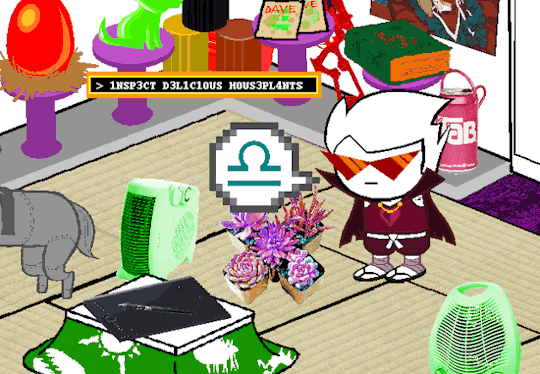
Wait. Does Terezi have some form of narrative control? She made it clear in one of the Epilogues that she was aware of Dirk’s narration. I’m going to assume that while Terezi herself can’t narrate, she can submit commands.
DIRK: I see you've found the command terminal.
Oh. So she can submit commands not through her own power, but because there’s one of those exile command terminals things on this ship. O.K. They have everything else on this ship, might as well have one of those too.
TEREZI: 1T S33MS TO M3 L1K3 L3TT1NG M3 BOSS YOU 4ROUND FOR 4 F3W M1NUT3S 1S TH3 L34ST YOU COULD DO TO M4K3 UP FOR WH4T PROB4BLY 4MOUNTS TO TH3 MOST BOR1NG 1NT3RG4L4CT1C VOY4G3 1N TH3 H1STORY OF SP4C3 TR4V3L
I don’t know, I think Jade’s voyage after Davesprite and John blew up might be a good contender for that title. Then again Jade had practice not having anyone with a degree of intelligence around to talk to. Then again she still had the internet on her island and could talk to her friends, unlike on the Prospit ship.
TEREZI: 4ND CONS1D3R1NG TH4T ON3 OF MY TWO PR1OR 3XP3R13NC3S 1NVOLV3D SCOUR1NG TH3 FR4CTUR3D, D1S1NT3GR4TING CORPS3 OF P4R4DOX SP4C3 FOR... WH4T F3LT L1K3 4N 3T3RN1TY,
Oh yeah, I guess that would also be a contender too.
DIRK: What, Heart and Mind?
TEREZI: M1ND 4ND H34RT, Y3S
I have a feeling Terezi purposefully switched them around to make her aspect first and to just be a tiny annoyance to Dirk.

Dirk, how dare you use Complacency of the Learned to even out a chair! Does Rose know you’re using her book like that?
> L1B3R4T3 L4LOND14N L1BR4RY
Thank you, Terezi.
TEREZI: DO3S ROS3 KNOW YOUV3 B33N US1NG ON3 OF H3R NOV3LS TO PROP UP TH4T DISGUST1NGLY T4CKY CH41R?
Terezi and I are one.
DIRK: (I captchalogue the book into my MSPA MODUS. Forget HASH MAPS, PICTIONARY, or any of that shit. This thing is where it's at.)
What the FUCK does MSPA Modus entail???
TEREZI: 4W WH4T TH3 H3LL
TEREZI: TH3 CH41R W4S SUPPOS3D TO F4LL OV3R
DIRK: I'm not sure I understand. Why would it? The four legs are all touching the floor.
TEREZI: ...
DIRK: Try not to think about it too hard.
Ha!
TEREZI: FOR SOM3ON3 WHO CL41MS TO KNOW 4 LOT 4BOUT JOK3S YOU SUR3 H4V3 CONT1NU3D TO S4Y B4S1C4LLY NOTH1NG FUNNY 3V3R
Oooh, burn! When I get around to doing my fourth read of Homestuck I’ll have to tally any instances of Dirk telling a funny joke just to see if this holds up.

For a second there I was really confused over what fractal nonsense was happening here, but then I remembered Dirk is controlling the narrative. That includes the pictures, not just the text.
DIRK: Not many really understand that when pleasure is taken seriously enough, it can easily mimic the appearance of business, just as when irony is practiced with enough passion, it becomes indistinguishable from sincerity.
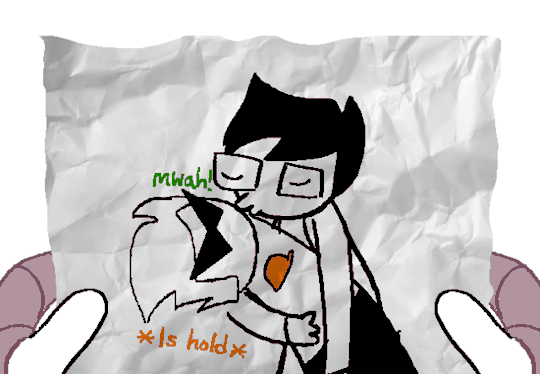
So Dirk’s idea of loosening up and having fun, whether for the irony or sincerity of it, is drawing himself in romantic situations with Jake. Yeah, that pans out.
(Seriously, why is Jake such a heartthrob? John is described as dorky looking and he and Jake are practically carbon copies.)
TEREZI: DO YOU... W4NT TO T4LK 4BOUT 1T...?
DIRK: Absolutely the fuck not.
Terezi, did you seriously expect him to answer with anything else?

This feels like a meme image.
TEREZI: TH4TS TH3 ON3 TH1NG 1 4LW4YS FOUND D1FF1CULT 4BOUT M4K1NG COM1CS W1TH D4V3
TEREZI: YOU H4V3 TO DR4W 333333V3RYTH1NG >:[
God, hard agree. This is why I could never have a comic. As much as I’d like to I just get burnt out with all that tedious drawing.
DIRK: Exactly. But sometimes, visuals are just a more effective way of doing things.
DIRK: So finding the right combination of words and pictures to communicate an idea efficiently is where the artistry lies.
DIRK: And sometimes that means dispensing with one or the other entirely when appropriate.
See, this is why the Homestuck style comic is so interesting. I don’t think other comics combined panels and text like Homestuck did, and now there are so many copies of the style out there!

Woah, I feel like I just got whiplash with the disappearance of the panels!
For the sake of precedent, I'm saying that we can cloak the visuals entirely and continue with narration alone, replacing the panel with a block of text like this, which we can call a “prattle” from now on.
Right, so when we go into a more book-like format it’s a prattle. Got it. Good name, since it’s just Dirk droning on to himself.
So then Dirk narrates Terezi using the command terminal to get him to do a slew of bizarre actions. He says it’s to show how much can be done in a short amount of time (a single block of text as opposed to 50 panels), but I have a feeling the real reason is so that we, the readers, don’t actually get to see him doing any of this stuff. He doesn;t get an audience to such an embarrassing display and he gets to rub our faces in it.
She has me undertake the most intense workout routine paradox space has ever seen, all while whistling the entire discography of the Swedish pop group ABBA, which she's taken a liking to recently for some god forsaken reason.
Terezi likes ABBA? That’s amazing. I need a video of Terezi singing and dancing along with Dancing Queen now.
(... And which coincidentally was a favorite cultural weapon of Her Imperious Condescension back on Earth, centuries ago. Mamma Mia in particular was repurposed as a sugar-coated propagandist piece, calling for worldwide submission to the Batterwitch's dictatorship. "My my, how can I resist ya," as the old saying goes.)
HOLY SHIT. Now I just had a headcanon that all trolls love ABBA.
DIRK: I told you I could have fun.
TEREZI: Y34H YOU SUR3 SHOW3ED M3 1 GU3SS
Dirk, are you saying Terezi purposefully trying to torture you was actually fun? ... Are you secretly a masochist? Do you... Do you like being bossed around and forced to do ridiculous stunts? I am learning so many things about Dirk I never expected.
TEREZI: WH4TS TH1S TH1NG OV3R 1N TH3 CORN3R
TEREZI: UND3RN34TH TH1S B1G SH33T TH1NG
DIRK: Don't look in there.
TEREZI: OH SHHHH 1M ONLY T4K1NG 4 P33K
DIRK: Terezi.
DIRK: Listen to me.
TEREZI: 1M JUST L1FT1NG UP TH3 COV3R 4 L1TTL3 W4YS!!!!
DIRK: Terezi please stop talking right now.
TEREZI: D1RK HOLY SH1T
TEREZI: W
Well that sounds sinister. With Dirk I would think ti was a robot of some kind, but given his new hobby of collecting things from various timelines and his skill in building it could literally be anything.
At first I was confused at the three panels that follow, showing Dirk’s room in disarray, but then I rememebered that Dirk did a whole bunch of shit we didn’t get to see because we were in Book Time.
ROSEBOT: So, I guess today is finally the day everything's been heading towards.
I honestly thought she was going to say “today is finally the day we fuck everything up”. Not sure if the actual line counts as a callback or not now.
ROSEBOT: Instead, it feels like the very notion of fortune is simply out of the question as a means of describing the potential outcome.
ROSEBOT: As though in this moment, luck isn't either strictly real or not real, or somewhere inbetween, but absent of meaning completely.
ROSEBOT: Luck took one look at our itinerary from here on out and said you'll just have to go on without me.
So it’s Schrödinger's Luck of Who Gives a Shit? Been reading so much Dirk I tried to channel my inner Strider there. Moving on I feel like this is a very bad situation for Rose to be in. Her Aspect is luck, so what does it mean for her when she’s in a position like this?
ROSEBOT: You aren't going to believe this, but it turns out that the deranged horny ramblings of a spurned anime-obsessive have essentially no therapeutic properties whatsoever.
Rose is a gift.
I wish I could copy and paste Dirk’s whole spiel about the ocean, both literal and metaphorical, but since it’s Dirk it’s just way too long. Suffice to say I thought it was some lovely writing and really got the the meat of who Dirk is as a character. His loneliness, his fear, his eventual peace, what it means to be an ascended Prince of Heart. Good stuff.
DIRK: What's that noise I'm hearing.
DIRK: It sounds a little bit like a cat being caught in a ventilation fan. A sort of...
DIRK: Inhuman screeching, combined with the grinding of metal.
DIRK: Are we even going to make it to the ground?
ROSEBOT: Oh, no,
ROSEBOT: The ship's fine as far as I can tell.
ROSEBOT: That's just Terezi laughing.
Terezi is also a gift.
Then we end with a rather pretty image of the ship coming in for a crash landing on an Earth-like planet. I would share it, but it’s a tall panel and this post is long enough as it is. Very curious what this planet is. I would guess it might be a Earth, but the landmasses don’t look like any on Earth. Could be artistic license, but I feel like we have too many Earths as it is. Let’s get some new planets up in here!
4 notes
·
View notes
Text
CROW CILLERS RECAP: ELAINE
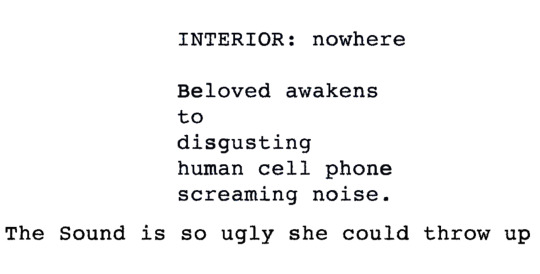

This month’s review is going to be a recap instead of a review, because so much is going on at this point that it’s important to establish what we know has happened before we can try to figure out what is happening. The focus of the recap here is the ostensible focus of the most recent episode: the character of Elaine, who might secretly be the main character of Crow Cillers. More than any other character, it is Elaine’s actions and decisions that have shaped the course of the show, mostly in ways she is completely unconscious of. Let us try and trace the evolution of the girl who’s changed her hairstyle so many times she doesn’t know what she looks like.


We don’t know much about Elaine’s pre-Marcus past. Everything is presented through a haze of memory and Ynce-Iche distortion. Chronologically, the first concrete scene we have with her, I believe, is her first encounter with Marcus, shortly before the events of season 1. It’s as if his analytical mind snapped her into reality. What we see, even at this initial stage, is a woman who has had enough of the Crow, of people like Marcus, of the useless trappings of life. Having remained aloof from these trappings, her life before this point is known only through half-acknowledged objects: a chocolate bar, a department store, a swimming pool. They exist as alien artifacts now, unable to be sorted properly into a coherent reality. As far as Marcus is concerned, she has no one but him at this point.
Wait, I’m wrong. The first scenes we see of her are with Jill.
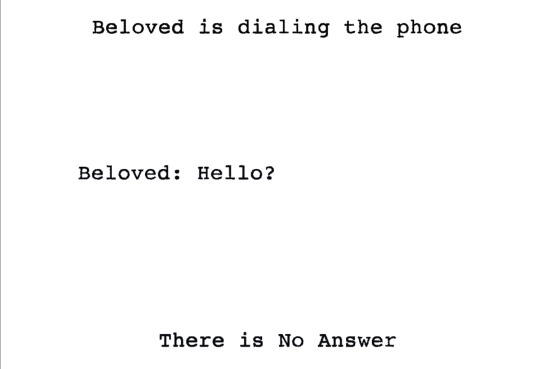

Elaine’s obsession with Jill makes her unique among the heroes of the show, none of whom have so intensely latched onto any objective or object, especially one who is also a subject. (It does not make her unique among the villains of the show.) We’re never given much insight into the nature of her obsession, what initially attracted her to Jill and what caused it to take root so deeply, but it’s implied that this compulsive drive is somehow linked to her connection with Ynce Iche, and that it’s partially responsible for her throwing herself at Marcus’s project with a self-destructive intensity.

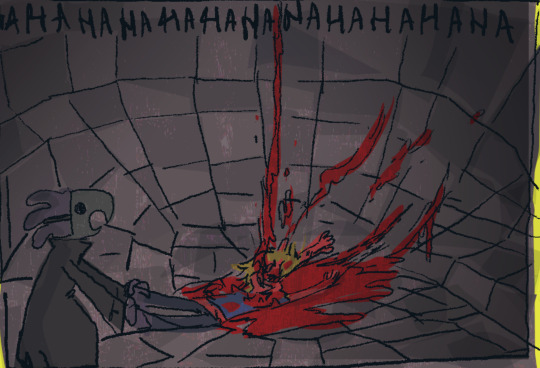
Season 1 Elaine is not a pretty sight. She is stretched thin, driven to desperation by some deep, implacable inner dissatisfaction with the world. The people around her are as alien & impenetrable to her as the landscapes she inhabits, the objects that have denied her pleasure: Jill, always standoffish and withholding, never the her that Elaine liked; Marcus, cold and clinical, hiding his perverted male gaze behind an unshakeable mask of composure. The slide kids of life keep passing through just to cause her pain, and they pass by entirely unaffected by anything she does. But Elaine does manage to affect Marcus, at her own expense, by giving him a glimpse of her own annihilation. Rejecting the boundaries of the real world, she destroys her discrete self, and plummets headfirst into the psychic echo chamber of Ynce Iche.


A mirror becomes a razor when it’s broken. The first shard to emerge from Elaine’s ego-schism is Elaine Jr., a defense mechanism come to life, designed to protect Elaine from the outer world whether she wants it or not. She manifests Elaine’s villainous side - the Jill-obsessed, misanthropic people-eater - in a form both more fully-developed and more fantastical than Elaine was able to achieve in the real world. She makes little distinction between what she’s already eaten and what is fresh food, between half-digested memories and still-living bodies. It is not so much that she is always hungry so much that she only consumes.

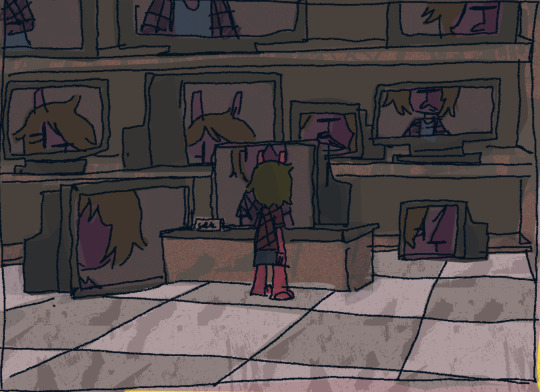
Separated from her eating apparatus, it is Elaine Sr. who is always hungry. The new world around her leaves her empty, because it’s made up of her insides. Passive and pacified, she begins to see more clearly the cruel streak in Elaine Jr. as it operates independently of her, and begins to resist the imperatives Elaine Jr. sets to keep reality from filtering in.


Meanwhile, the unseen forces of attraction that drove Elaine into Ynce Iche are still at work, as the Crow Cillers find themselves pulled into the dream-world, and Marcus continues his attempts to gain entry. The same forces work on Elaine in the opposite direction: unable to attain complete inertia, she develops an increasingly defined sense of dissatisfaction with this new world. With Elaine Jr. off doing her own thing, the dissatisfaction is differently flavored from that of season 1 - instead of cutting like a razor-blade, it expands like water to fit the confines of whatever is containing Elaine now. Defanged, she yearns once more to penetrate reality.
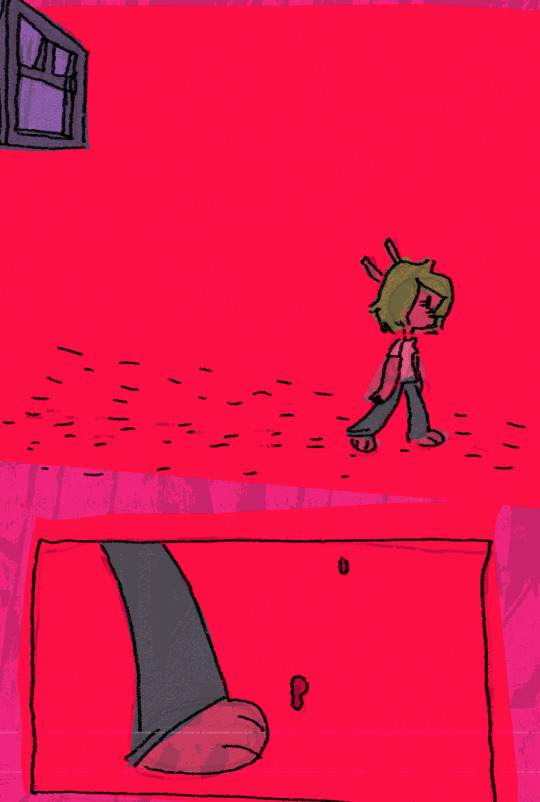

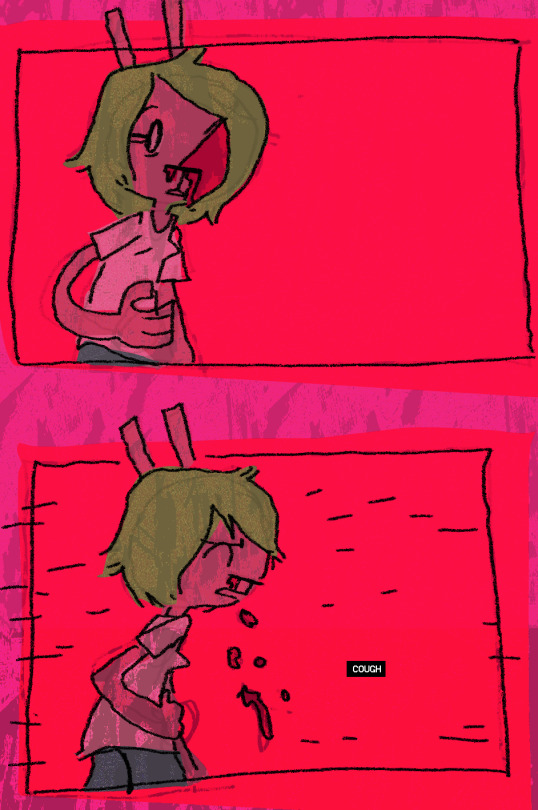
But something is missing - even here, in this land contoured to her consciousness, she’s unable to manifest her desires into something concrete, to make sense of the motions she’s going through. As Partydog predicted in the crossover episode, the script calls for real blood, and there is no real blood left in Elaine, it seems. But she has the knife - that’s real enough. And when she has finally had enough of Ynce Iche, she does the unthinkable, and does something. It’s hard to judge the ethics of Elaine killing Dustin; it’s a necessary sacrifice, the initial act of agency that frees Elaine from her purgatory of potentialities, of options but no drive.

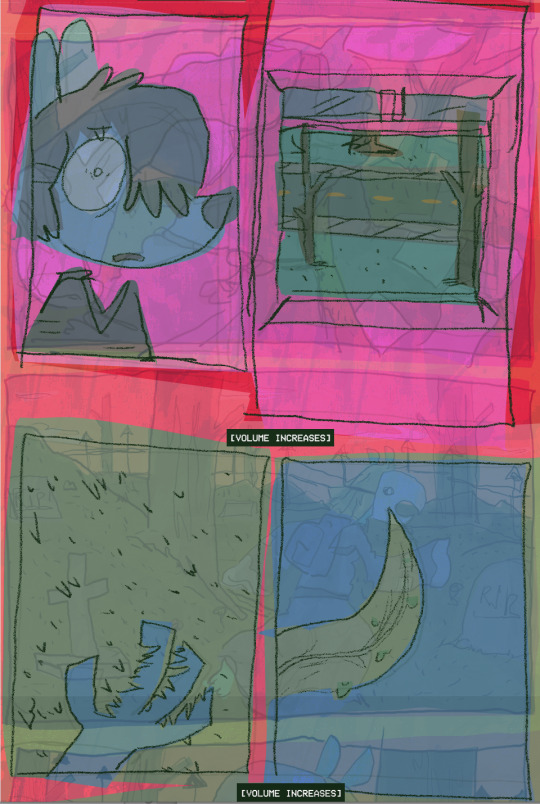
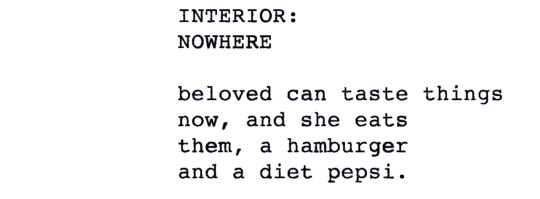

In Season 3, Elaine seems to have reached an equilibrium ideal to her character. Her crueler nature is ensconced in its imaginary kingdom, now feeding off of the energy of That Kid and indulging in vindictive fantasies towards Jill, while her more peaceful self finds a more peaceful home with the Crow Cillers Cociety. Yet this place of recovery only fills her with new self-doubt. She can’t feel at ease with these people, living as she is under a false appearance, a false name. The CCC lead lives of double identities, pretending to be Crows in their work hours; with her unmasked face a mask of its own, she’s left with little assurance as to who she actually is, or what side she’s on.

But she’s not ready to move off on her own again, for obvious reasons. As the courtroom drama involving Jill suggests, Elaine Jr. has always been the advisor, a voice in the ear of the queen, making no decisions but seemingly influencing everything with her madness. Elaine was the former queen, and while she’s ditched out on that particular voice, how can she trust the voices in her own head now? She needs the support group of the CCC to guide her somewhere better.
Unfortunately, she’s forced to abandon them at a key moment, when she again commits the one act that seems to come naturally to her, this time in defense of Mary. While killing to protect others instead of oneself might reflect significant character development, all Elaine registers in the moment is the shame and terror of being exposed, of having her true face reflected in the knife.
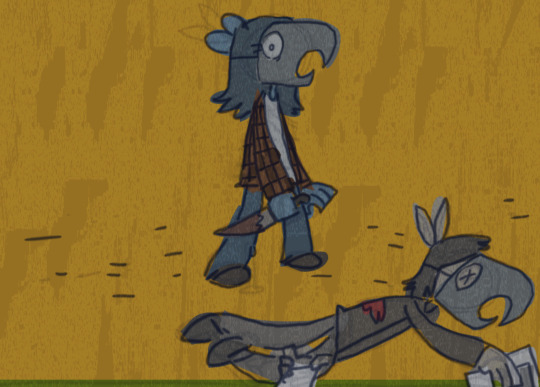
The escape that follows is thorough; we don’t see Elaine again for almost 10 episodes. Meanwhile, Elaine Jr. finds a blood sacrifice of her own, and enters the real world for the first time as Elaine Jr. X. EJX, intriguingly, behaves in much the same way Dustelaine did in the prior season: reserved, guarded, restricting their bloodthirsty tendencies to the Ynce forest. But she’s still out of control, especially when it comes to Jill, and a confrontation seems unavoidable.

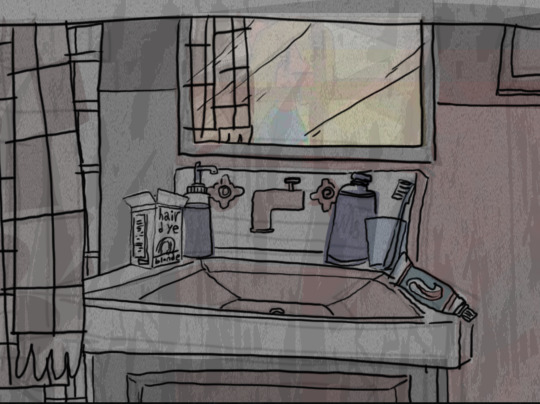

Finally, 4 episodes into season 4, we catch our first glimpse of Elaine (just “Elaine” now), trying to make peace with the funhouse mirror version of her body that she ended up in. Season 4, coincidentally, also looks like a funhouse mirror version of season 1. We have the group of misfit kids forming a friend-and-otherworldly-activities group called, through no agency of their own, the “Crow Killers”. We have Jill back at home with the Ru’crew. We have the Special Musical Act whose relation to the main plot is currently unclear. And at the center of it all we have Elaine, working a shitty job which sometimes involves murder. After all this time, it’s back to the Order, except no one is wearing a mask this time. This is perhaps the key difference - the strict symbolic language that governed and restricted the show in its early episodes, the literal order of the Crow, has finally broken down, and everything is up for grabs. A new symbolic language has to be formed from the images that were always there; the difficulty lies in translating it.


This shift exposes the sea change the series has undergone, which seems obvious when we walk through it like this. One of the basic goals of Crow Cillers has always been to penetrate the impermeable barrier of objects, to show the true context of an empty room. Now the lifeless objects that were given character space in the opening credits of season 1 really have come to life, and that’s its own kind of horror. The rooms of season 4 have broken through the false layer of objectivity and become one with the ideas they contain. This abundance of life is wonderful and threatening. It must be contained, countered, without being destroyed; it must be conveyed properly. It is no wonder that Beloved’s most evil trait thus far is not her schemes or her motives, which are still completely opaque, but her bad writing. (And appropriate she should find a foil in Emma, whose creative drive is at an ebb this season.)
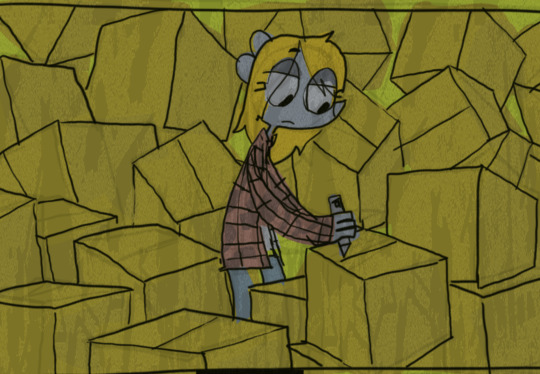
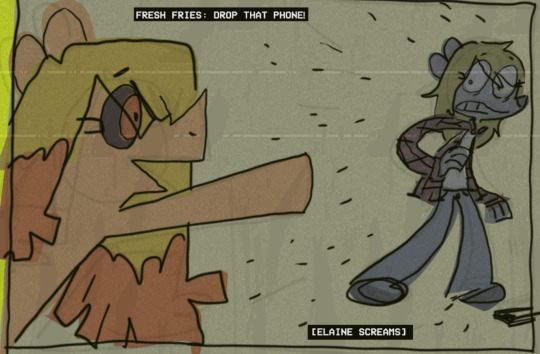
I’ve gotten off-topic, and the topic is Elaine. Fresh Fries, the first magical manifestation Elaine has encountered that exists outside of her own fractured identity, serves as the latest catalyst to action for our girl. Perhaps unsurprisingly, her first non-murderous altruistic act is not only glossed over by omission, but murky in intent. Why did she take the horse home? To rescue it, or to own it? She’s terrified when she discovers its sentience; would she have saved it if she had known it was a subject and not an object? It’s easy to forget she’s wearing the body of the last guy who walked into her home uninvited. Like so much with Elaine, elision colors her actions with ambiguity. After three and a half seasons, do we know who she is?

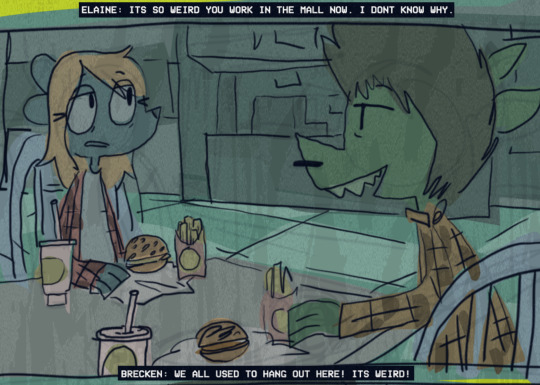
No, we don’t, and that might be her saving grace. If she can keep something as good as a friendship with Brecken a secret, then it stands to reason that what continues to lurk unseen inside her might be more benevolent than anyone had suspected, least of all herself. Her reaching out to him at the end of the episode suggests that it’s this uncharted territory within herself she’s starting to explore now: the land of human connections, of shared meals, of recontextualizing those dreamscapes of capitalist debris into something slightly less intimidating. The blade she’s been holding onto since season 2, perhaps longer, has been sheathed. You can go anywhere from true neutral.
16 notes
·
View notes
Text
10 + 11 questions tag
Great thanks and acknowledgments to @letsflytoasiarenata and @belladonna2017 for sending me questions! So, here goes:
A. Always post the rules. Answer the questions then write (10 or 11?) new ones.
B. Tag 11 people and link them to the post. Tell the person who tagged you that you’ve answered their questions.
My questions:
Favorite villain or antagonist.
Favorite character trope/archetype.
Least favorite character trope/archetype.
Least favorite drama trope.
Name a character that you initially disliked but came to love.
Favorite multi-season drama?
Favorite example of trope dissection/dispellation.
Favorite time travel drama.
Choose a period drama, sageuk, or wuxia that you would like to time travel to.
Historical event/time period/historical figure(s) that you want to see a show explore.
Name a show with the best (most intensive yet reasonable/plausible) plot twists.
Favourite historical period in sageuks/wuxia?
This question made me ponder for a bit, since because the center stage of most wuxias is jianghu, or the pugilistic world, largely defined as “a sub-society isolated from mainstream or governmental law”, henceforth most wuxias largely feel timeless, with no specific historical dynasty or time period adhered to the story. Granted, there are some fusions centered around court politics that acknowledge the pugilistic world and combine certain wuxia elements – Nirvana in Fire (fictionalized Northern and Southern Dynasties) rather heavily features wuxia elements, and The Glory of Tang Dynasty (Tang Dynasty) more minimally, but also somewhat.
I suppose it’s a moot point, since upcoming xianxia wuxia Martial Universe is set in the “culturally vibrant Spring & Autumn Era”, but essentially – generally I actually don’t care about what time period a wuxia is set in.
Now, if we’re talking about a historical period in general, I’ve noticed that dramas I’ve enjoyed have tended to take place in the Qing Dynasty (not to mention Manchurian blood runs throughout my veins) – it feels like an appropriate mix of various different ethnic influences, from Mongolian and Manchurian to Han to even some Western influence. (In theory, I would imagine myself enjoying non-spy Republican dramas, but I actually have not.)
As for sageuks, I have only seen one thus far – set in Goryeo. I didn’t enjoy that drama, but the costuming was pretty.
Which story/book/show you would like to see adapted in South Korea/China/Japan?
I tend to stray away from remakes, and I tend to not read source novels until after a drama release, largely to avoid disappointment and comparisons (e.g., even reading The Rankings of Lang Ya Hall in preparation for Nirvana in Fire made the latter slightly disappointing).
But personally, I want a faithful adaptation The Concubine’s Daughter is Poisonous, featuring full-on leg-decapitation, time travel/reincarnation, and bloody revenge. (So, no, The Princess Weiyoung did not do.)
Drama that you watched for your fave and he/she owes you after what you’ve endured for her/him? :D
Swordsman, the Yumama-fication of Jin Young’s The Smiling, Proud Wanderer. But even with Wallace Huo and Joe Chen’s sizzling chemistry, I simply was unable to complete the show.
More strictly, I somehow completed (or, more like FF-ed in frustration) The Imperial Doctress and The Journey of Flower despite the character-butchering, torture, and sheer WTF-ery of said shows. Thanks, Wallace Huo. :D
I would also complain about Love Me If You Dare, since I think I hung on more for its popularity more than anything, and IMO it sort of went haywire, but it wasn’t *as bad* for me as the ones mentioned above. I have similar sentiments about Perfect Couple.
Drama that still haunts you?
Do you not see me still suffering from Glory of Tang Dynasty withdrawal? (To be fair, ~ 2 weeks isn’t particularly long, so who knows?)
The Journey of Flower left a rather brutal impression. The Legend of Zhen Huan, Nirvana in Fire, and Bu Bu Jing Xin are definitely shows that will stick with me for a very long time.
Most stylish drama character in your opinion?
(I have a tendency to think of dramas that I’m currently perusing or obsessing over, so a lot of my answers will definitely feel very GOTD-centric. Just a warning.)
It turns out a lot of my files got cleared out these days, including a bunch of precious caps. But here’s a very nice video on Bilibili featuring Li Chu’s (42, apparently) outfits.
Drama that you didn’t expect you will enjoy?
Medical Examiner Dr. Qin, since I rarely ever watch crime procedurals, but I honestly adore the show so much.
Boss And Me, since it seemed to be your typical chaebol-ordinary girl set-up (and it is, but the way they explore and develop ShanTeng feels very heart-warming and much more realistic than expected. <3)
Favourite drama OST’s lyrics?
I’m a fickle, undecisive person, so I actually don’t know which drama OST is my favorite. Here are the lyrics for: Three Inches of Heaven (Bu Bu Jing Xin) and White-Haired Lament (Sound of the Desert). Recently, though, I’ve been drowning myself in 霍尊’s 素颜 (The Glory of Tang Dynasty). Here are my awkwardly translated lyrics:
你是春的使节 让残雪融解
You are the ambassador of spring, thawing the last residues of snow
染成青黛的天 等着细雨停歇
Bleeding into the indigo skies, waiting for the drizzle to cease
你素颜 裹着云烟
You, bare-faced, swath the misty clounds
诗意了远方 湿润了心间
[Made] afar poetic; softened the heart
闭上眼 姹紫嫣红都不觉甜
Closed eyes; even the most spectacular colors lack indulgence
只为你的容颜
Only for your appearance
豁然间 春光如恋
At sudden enlightenment, the spring scenery exudes amour
渲染了 你的出现
Romanticizing your emergence
最留恋 不是云巅
The [things] most reluctant to part are not the clouds atop the summit
是千万里朝颜和暮雪
But the flowers and twilight snow thousands of miles apart
梦回间 春光流泻
Revisiting in dreams, the spring scenery spills out
归去在 落花时节
Returning to the season of falling petals
待离别 青空绵绵
Until parting; the clarity remains unbroken
你会成山水���那一点 如烟
You will become that point between the water and the mountains; as mist
The most memorable quote from a drama?
为何你还要贬我来抬他?
Why would you still belittle me to elevate him?
[One of the many things I love, love about The Glory of Tang Dynasty is the occasional bits of meta they incorporate into the show, sometimes even to dispel certain tropes – especially when comparing characters, most commonly male leads who always seem to be presented as foils of each other, this is always something to keep in mind.]
One thing that you appreciate the most in dramas?
Events occurring at totally coincidentally (un)-perfect timing.
Slow burn or love at first sight OTP dynamic?
It actually depends. Both are acceptable if executed properly. The childhood trope disguised as “love at first sight” tends to annoy me.
Favourite remake/adaptation?
Lotus Lantern (2005), adapted from traditional Chinese folklore.
If you could change one thing about one drama, what would it be?
I just … somehow, fix Jingyao’s arc in Glory of Tang Dynasty. (I don’t know exactly how – since they actually did explore some interesting things and consequences with her character rarely ever shown in period C-dramas ever, I slightly feel inclined to forgive the show for … *coughs*. But for starters, she should really learn to say no to drugging people.)
Who is a popular actor that you can’t seem to get into?
Li Yifeng. (Not that I’ve ever made an active effort to like him or anything – Chusen simply did not particularly work for me.)
What’s a popular drama that you didn’t like/dropped?
Prince of Lan Ling, The Princess Weiyoung, General And I, Ice Fantasy, The Imperial Doctress, The Journey of Flower, Legend of MiYue, The Legend of Chusen, Empress of China, The Four
Underrated favourite drama?
The Glory Of Tang Dynasty! ‘Tis the sad life when no English subs exist.
An actor/actress you wish would do dramas more often?
Zhou Xun and Chen Kun!
A guilty pleasure drama?
Love O2O. Cute fluffiness + pretty people + strong OTP + RPG = very enjoyable escapism.
What drama would you say has the best ending?
Nirvana in Fire.
Wu Xin: The Monster Killer – a lot of people were unsatisfied with its melancholy conclusion (re: there’s a Season 2, guys!), but personally it actually worked for me, appropriately concluding the entirety as if it were simply a 20-episode show. Since Season 2 does take place in a rather different setting, with, Wu Xin aside, a different set of characters, I thought it nicely ended the Season 1 arc.
If you could crossover two (or more) dramas, what would they be?
This! This is actually a very creative question – kudos to whoever came up with this. Earlier @yansanniang and I were discussing a GOTD x Legend of Zhen Huan cross-over – sort of, where An Qingxu, his medicinal abilities, and his emotional instability decided to go shake things up at Yongzheng’s court. The other day I was thinking about how things might go down if Empress Zhang decided to invite a certain 麒麟才子 with a penchant for ruining birthday parties to her own birthday party, hoping to gain his help to aid her with her own ambitions…
Who is a female character that the fandom hated, but you loved?
Hua Qian Gu. I agree, there were times where she felt overly childish and overbearing (I believe it was equal parts frustration and even hatred at her AND BZH), and I find it difficult to watch someone who literally refused to change, but ultimately she still won me over.
What’s your favourite fictional found family?
Dr. Qin Medical Examiner’s Qin Ming, Da Bao, and Lin Tao. In my mind they’re a family. :))
Tagging: @swordsandparasols @yansanniang @itsjustveryludicrous @alakoba @renewedmotionforjudgment @loquatly @cdramaddict @whimsyfulwanderings @seventh-fantasy @dangermousie @thedazzlingdarkness
#okay but some of the stuff in the lyrics weren't even in the dictionary T_T#and as an ABC with no 文化...*cringes*#there's a reason#lack of time aside#i don't sub things
7 notes
·
View notes
Text
Bored at work
r1.What is that thing that no one, not even your partner, your mother or your best friend, knows about you? I talk to myself when I’m alone. Like A LOT.
2. What would make you feel embarrassed in public? Almost anything. I’m easily embarrassed.
3. What do you think is your biggest flaw? What have you done about it? I’m a pushover for sure. I also overthink situations and needlessly worry. I work on all of these issues in therapy (though I should probably attend more regularly).
4.What is your biggest strength? How did you develop it? I’m gonna say my greatest strength is my kindness and gentleness. And it’s developed from my desire to make other people feel how I’d like to feel. That’s it.
5. What do you have to put up with in your life? How long have you been tolerating it? That’s strange wording. I was sexually assaulted as a child and as a teenager , so I’ve “had to put up with” that trauma. I also suffer from anxiety and OCD (partially related to those events), self-esteem issues, body image issues...
6.If you could change your name what would your new name be? I love my name as it is. It suits me perfectly.
7.If you could change your appearance, how would you decide to look? I’d be thinner with bigger breasts for sure. And I’d like thicker and longer hair on my head.
8. What colour dominates your wardrobe? I’m partial to pastels and soft, feminine colors. But I wear a lot of black too. It’s slimming and I like how it contrasts with my blonde hair and pale complexion.
9.Which song do you sing only when you’re alone? What DON’T I sing is a more appropriate question...
10. Who do you secretly envy? Why? At almost any other time in my life I’d have an immediate answer for this but you know what? I don’t envy anyone like that anymore. I like my life and the person I’ve become.
11. What do you really want? To lose the 50 lbs I’ve (semi recently) gained. And I’m working on it...
12. What is the way you often sabotage yourself? I overindulge. I drink and eat too much or too little, I love too hard, I obsess like crazy. Take your pick!
13.Who would you like to please the most? My parents and sisters, my partner.
14. What do you think a stranger’s first impression of you would be? I think generally people think I’m friendly and bubbly.
15.What reoccurring dream do you have? What do you think is the message your subconscious is sending you through that dream? I have a few. I have a recurring dream that I have overdue library books, I’m late for class, I missed the bus home (never TO school), or that I cannot for the life of me remember my locker combination. It might be telling that most of my recurring dreams center around school... what that means exactly, who knows.
16. What would you try now if you were sure you wouldn’t fail? Singing/composing music
17. What was that thing you never tried because you were afraid of failure? See above. Among several other things.
18.What was your greatest disappointment in life? Not sure if I’d categorize my trauma and abuse as “disappointments” but maybe those? Or I guess being cheated on was a major blow.
19. As a kid, what did you dream of becoming when you grew up? An author or writer of some kind. That’s still the goal!
20. What are you really good at? Writing
21. What can you do better? Writing
22. What worries you the most when you think about your future? Losing my loved ones. Also, working in a fertility clinic has instilled in me many fears about my own ability to conceive, carry or raise a child.
23.What really sucks in your life? Who has the power to change it? Blah blah blah....I don’t feel like answering this.
24. What is your life really about? What is your purpose in life? Love, passion, goodness. My life is about creating, celebrating and sharing all of those things.
25. What fear could wake you in the middle of the night? I have anxiety so that’s a very long list.
26. What joy could wake you in the middle of the night? My sweetheart
27.What are you grateful for? My loved ones. My angels. My health. All the opportunities I've been afforded throughout my life. The second chances I’ve been granted. My future.
28.What time of the day do you feel the most energetic? And what do you usually do in those moments? It really varies based on the day. And when I have a burst of energy, I tend to clean or organize something.
29. If you knew you had only one week to live, how and with whom would you spend it? With my family, my boyfriend, my closest friends and my babies.
30. Why do you think your most favorite film touches you so deeply? Well, my favorite movie is Legally Blonde. I wouldn’t say I find it “touching” as it’s mostly just a fun, good-natured chick flick, but I do find it inspiring. Elle Woods is everything I aspire to be.
31. If you could be a fictional character from a movie or a novel, who would you want to be? Why? How coincidental! I’d be Elle Woods because she’s smart and successful while never compromising her values. She’s friends with everyone she meets and she lives a deliciously PINK lifestyle. My dream!
32.What are you really bad at? Sports or any kind of athletic activity, really.
33.Who would you like to forgive and forget? I struggle with this question..
34. Do you often hear your inner voice? What does it usually tell you? I do. It often tells me to calm the fuck down.
35. When was the last time you cried without anyone seeing you? Why were you crying? The other night I cried in bed reliving old memories that I should absolutely not fixate on. Bad habit.
36. What do you want people you meet for the first time to think about you? I’d like them to think I’m a nice person
37.What’s your most striking physical attribute? Do you like it? My blonde hair is usually what gets noticed/commented on. And yes, I like it.
38.If you had the opportunity to go back in time and make a change, would you still want to have the same parents? Of course
39.If you could go back in time and change things, how would you alter the last ten years? I’m truly in a place where I can say “I’d change nothing.” I love where I’m at in life and everything I’ve endured up until this point was necessary to get here.
40. If you could get rid of one of your responsibilities today, what would that be? I’d be at home instead of at work right now filling out a pointless survey. (Ok, I actually love these. But I’d rather be filling it out from home....)
41. What is the biggest lie you tell yourself? I’ll start my diet tomorrow.
42. What do you think is missing in your life? I could use some more willpower and self-control. Working on it...
43. What do you think is the biggest injustice that was ever done to you? I already answered this.
44. What type of person angers you the most? Bigots of any kind. Arrogant people, too!
45. Who never fails to make you feel good about yourself? MY BABIES
46. If you could start all over again, what would you want to study? I love my degree and I’m even considering grad school.
47. Which type of intelligence do you wish you had: kinetic, visual, interpersonal, linguistic or mathematical? Linguistic
48. What is your biggest pet peeves? Walking behind slow people in a store or other public place makes me wanna scream!!
49. What was the one opportunity you always believed you’ve missed out on? Eh... I’m not sure.
50. What do you like about yourself the most? My heart
51. What do you regret the most? No regrets anymore
52. What is the most hurtful thing you’ve ever witnessed? Why did it affect you? I don’t care to elaborate
53. What would you like most to be acknowledged for in your life? Being a kind person who made other people feel good.
54. What is the first thought that usually crosses your mind the second you open your eyes in the morning? “It’s too early”
55. What is that thing about yourself that you’re sick and tired of? My anxiety (although it’s definitely at the mildest it’s EVER been!), my lack of self-control when it comes to food
56. Who really depends on you? Why? No one *depends* on me that much. I have a lot of close relationships with people who lean on me for support when they need it, but I’m not anyone’s sole provider of anything.
57. What was the main factor that played a role in your biggest mistake? I don’t really understand the question and I don’t think I even want to answer it anyways.
58. What was the main factor that played a role in your biggest success? The support of my family
59. What childhood memory sizzles your heart? What does that even mean... lol. Is a sizzling heart a good thing or a bad thing?
60. What was the most frustrating period in your creative life? The writer’s block that I’m currently suffering. It’s maddening. It’s depressing. I’m SICK of it!
61. Do you love yourself? I’m getting there!
62. If you were your own life coach, how would you guide yourself? Well we are all our own life coaches, are we not?
0 notes
Text
PowerLine -> President Trump’s First Re-Election Ad – Updated: CNN Refuses to Run It
CNN FAKE NEWS RUSSIA Trump at HoaxAndChange.com
CNN Fake News at HoaxAndChange.com
Powerline image at HoaxAndChange
Daily Digest
President Trump’s First Re-Election Ad [Updated: CNN Refuses to Run It]
McMaster’s Obama (don’t call them) holdovers
Was it a hack or a leak? (3) [with comment by Paul]
DACA at the five-year mark
Collusion gone missing
President Trump’s First Re-Election Ad [Updated: CNN Refuses to Run It]
Posted: 15 Aug 2017 11:43 AM PDT
(John Hinderaker)
We truly have entered the era of the permanent campaign. The 2020 election is more than three years away, and President Trump has already released his first ad. I suppose the ad has in view not only Trump’s re-election but also the fact that the Democratic Party press doesn’t want to cover the administration’s accomplishments, preferring to obsess over Trump’s foibles and non-existent scandals. The ad seeks to remind voters of Trump’s record so far, which is, in fact, impressive:
As usual, the Trump administration has to rely on its own devices to get its message out, the press being occupied elsewhere.
UPDATE: CNN refused to run the ad on the ground that it is inaccurate. The ad features several CNN personalities among the media people who are pictured while the voiceover says, “The president’s enemies don’t want him to succeed.” CNN said:
“CNN would accept the ad if the images of reporters and anchors were removed,” a network spokeswoman told DailyMail.com.
“Anchors and reporters don’t have ‘enemies,’ as the ad states, but they do hold those in power accountable across the political spectrum and aggressively challenge false and misleading statements and investigate wrong-doing,” the spokeswoman added.
No word on whether she was able to say it with a straight face.
McMaster’s Obama (don’t call them) holdovers
Posted: 15 Aug 2017 10:48 AM PDT
(Paul Mirengoff)
According to the Daily Caller, about 40 of the 250 officials on the National Security Council (NSC) are Obama administration holdovers. Their boss, H.R. McMaster, has instructed that these folks not be called “holdovers.” This might make sense from a team-building perspective. But since I’m not part of the team, they will be referred to as holdovers in this post.
The Daily Caller’s Richard Pollock and Ethan Barton profile some of them. They report that Allison Hooker remains NSC director for Korea, no backwater job given current circumstances. According to Pollock and Barton, Hooker is “an architect of former President Barack Obama’s Korean policy.” This may be a reach because they also say she joined the NSC in 2014, by which time Obama administration Korea policy was in place.
Nonetheless, President Trump has denounced Obama’s Korea policy — “strategic patience” — in harsh terms. Thus it’s surprising to find his administration’s NSC adviser on Korea still in place more than half a year into the Trump administration.
Pollock and Barton report that McMaster’s director for South America is Fernando Cutz. He received his master’s degree in international relations from the Clinton School of Public Service in or around 2010. The Clinton School operates on the grounds of the Clinton Presidential Library in Little Rock.
According to Pollock and Barton, Cutz, who previously reported to former deputy NSC advisor Ben Rhodes, enthusiastically endorsed Obama’s Cuba policy throughout his tenure as an NSC staffer. He helped plan and organize Obama’s trip to Cuba.
Andrea Hall is another holdover who reported to Ben Rhodes. She serves as NSC’s senior director for weapons of mass destruction, terrorism and threat reduction.
Pollock and Barton cite a paper she published in December 2002, while earning her doctorate, in which she criticized the West for not doing enough for Vladimir Putin. She wrote that “Russia has received few tangible benefits from its cooperation with the United States,” and claimed that Washington was “ignoring Russian concerns.” She added:
Given that Putin has received significant criticism for his foreign policy concessions and that he has valid concerns about the Russian economy, Washington would be wise to help Russia achieve some of its goals as well in order to cement this partnership.
In fairness to Hall, this thinking does not seem inconsistent with Trump’s. Coincidentally (or maybe not), it mirrors the “blame America first” attitude of McMaster’s Israel-Palestine guy, Kris Bauman. He blamed Israel and the Bush administration for undermining the peace process by failing to recognize Hamas’ moderation.
Rear Adm. David Kriete, another Obama holdover, is NSC’s director for strategic capabilities policy and responsible for policy on nuclear weapons-related issues. According to Pollock and Barton, he was a representative to the interagency panel that wrote Obama’s 2010 Nuclear Posture Review, which reflected the former chief executive’s vision of a “nuclear-free world.”
That document received considerable criticism from conservatives. According to Pollock and Barton, “National Review” found that it “undermines the basis of the deterrent policy that has helped maintain the peace for more than 60 years.”
Pollock and Barton discuss several other holdovers. However, the four discussed above strike me as the most problematic.
Michael Anton, an NSC spokesman and author of the famous “Flight 93 Election” article, told the Daily Caller that all of the holdovers (I assume he didn’t use that word) are “stalwarts” who faithfully follow the president’s foreign and military policies. I have no reason to believe that any holdover is insubordinate.
However, the NSC can help shape a president’s foreign and military policies. That’s particularly true where, as here, (1) the president lacks experience with, or apparent in-depth knowledge of, foreign policy issues and (2) the national security adviser is extremely aggressive.
Thus, the cliche “personnel is policy” seems particularly apt in the context of this NSC staff. That’s why it’s reasonable to be concerned about some of the Obama holdovers and about McMaster’s purge of some pro-Trump staffers.
Was it a hack or a leak? (3) [with comment by Paul]
Posted: 15 Aug 2017 10:43 AM PDT
(Scott Johnson)
Salon has a good column summarizing the argument presented by Patrick Lawrence in the Nation asserting that the alleged Russian hack of the DNC email was rather an inside job. It nicely complements our previous installments in this series. Author Danielle Ryan quotes the official DNC response to Lawrence’s Nation article provided to the Nation after publication and now appended to the article:
U.S. intelligence agencies have concluded the Russian government hacked the DNC in an attempt to interfere in the election. Any suggestion otherwise is false and is just another conspiracy theory like those pushed by Trump and his administration. It’s unfortunate that The Nation has decided to join the conspiracy theorists to push this narrative.
Ryan rightly comments that the statement “is so lackluster it is almost laughable[.]” Students of logical fallacy may recognize both the argument from authority and the ad hominem in the three-sentence DNC statement. That is pathetic.
Via Glenn Reynolds/InstaPundit.
PAUL ADDS – The case that the Russians hacked the DNC emails has always been based on the conclusion of U.S. intelligence agencies. To my knowledge, these agencies have not provided the information that forms the basis for their conclusion. Thus, the public has never been in a position to assess the conclusion’s validity.
As long as there was no credible person or organization building a case to the contrary, I was willing to believe — naively perhaps — that the conclusion of the intelligence agencies was very likely correct. Now, it seems that a credible case to the contrary is emerging.
I think it is time for the intelligence agencies to back up their conclusion if they can so that those who defend it don’t have to rely on argument from authority.
DACA at the five-year mark
Posted: 15 Aug 2017 08:47 AM PDT
(Paul Mirengoff)
Mark Krikorian points out that today is the fifth anniversary of the Deferred Action for Childhood Arrivals (DACA) program. DACA is President Obama’s lawless amnesty diktat. It enables adult illegal aliens who claim to have come to the U.S. before age 16 to get work permits, Social Security numbers, driver’s licenses, etc. Nearly 800,000 people have done so.
Candidate Donald Trump promised to end DACA on “day one.” Like much of his campaign rhetoric, the promise was empty. DACA remains in place. “Day one” — like “right now,” and “very soon” — turned out to mean “later, if at all.”
Krikorian argues that it’s time to end DACA. He explains:
Adults who were brought here illegally by their parents at very young ages (toddlers, not teenagers) are indeed good candidates for amnesty – they’ve grown up here and formed their identities as Americans. But it’s Congress that makes laws, not the president, as President Obama himself pointed out a year before the DACA decree: “for me to simply through executive order ignore those congressional mandates would not conform with my appropriate role as President.”
DACA may be on its way out without the active involvement of the Trump administration:
The anti-borders crowd’s real fear is that DACA will be added to the multi-state lawsuit, led by Texas, against DAPA – Obama’s even larger lawless amnesty for illegals with U.S.-born children, that never went into effect because it was stopped in the courts.
Since the legal pretext used by the Obama administration to justify DACA is identical to DAPA, it could well be that at the next hearing on the lawsuit, coming up in a few weeks, the judge will allow DACA to be swapped in for DAPA (which DHS has rescinded). If that were to happen, DHS Secretary Kelly, now White House Chief of Staff, has said the administration might not be able to defend it in court. (I don’t think there’s any “might” about it.)
Krikorian sees a way to put DACA-style amnesty on a solid legal footing as part of a big fix of our immigration system:
The president has expressed sympathy for the DACAs, a sentiment probably shared by most Americans. But rather than reacting to events, the way to proceed would be to phase out DACA and at the same time propose a legislative compromise.
Announce that DACA renewals will only be processed until December 31, after which they will start expiring. (It would take two years for all of them to lapse.) That would light a fire under Congress to pass a package upgrading the DACAs from their lawless Obama amnesty to a genuine lawful one, in exchange for the RAISE Act, the Davis-Oliver Act, and mandatory E-Verify.
The Democrats will balk at first, but the clock will be ticking.
I’m less confident than Krikorian that Democrats will ever go along with such a compromise. Considering the alternatives, however, I think it’s worth a try.
Collusion gone missing
Posted: 15 Aug 2017 06:04 AM PDT
(Scott Johnson)
The latest Washington Post collusion story is different from the others. The story is “Trump campaign emails show aide’s repeated efforts to set up Russia meetings.” Last night Paul Mirengoff summarized and deconstructed the story here.
If you’ve been following the collusion hysteria, you won’t want to miss this story. The story comes in the accustomed form — under the byline of numerous Post heavy hitters (Tom Hamburger, Carol D. Leonnig and Rosalind S. Helderman with the assistance of Adam Entous, Alice Crites, Devlin Barrett, David Filipov, Philip Rucker and Ellen Nakashima), features the usual anonymous sources, and stands at one remove from the original documents — but this is a collusion story with a difference. The collusion has gone missing.
The story is based on “20,000 pages of documents the Trump campaign turned over to congressional committees this month after a review by White House and defense lawyers.” The Post reporters haven’t seen the documents themselves, but relevant parts have been read to them “by a person with access to them.” And that’s not all: “Two other people with access to the emails confirmed the general tone of the exchanges and some specific passages within them.” I guess that’s the way the Post heavy hitters were taught to do it in journalism school.
The Post heavy hitters won’t come right out and say it, but those parts of the 20,000 pages that were read to them lack the whiff of collusion. The emails involving a volunteer campaign policy adviser demonstrate that proposed meetings with the Russians “generated more concern than excitement within the campaign[,]” which of course does not slow down the heavy hitters one bit.
Again, that’s not all. Proposals sent to then, campaign manager Paul Manafort, were expressly rejected. “We need someone to communicate that DT is not doing these trips [to Russia],” Manafort wrote.
The Post solicited a comment from an unnamed spokesman for Manafort. The unnamed spokesman commented that the email chain provides “concrete evidence that the Russia collusion narrative is fake news.” That seems an entirely reasonable interpretation of the evidence presented in the story.
Wary of readers who may need to brush up on ancient history, the Post heavy hitters add that Manafort’s “Virginia home was raided by FBI agents three weeks ago as part of an investigation by special counsel Robert S. Mueller III[.]” It’s amazing what you can do with nine reporters on a story like this.
PowerLine -> President Trump’s First Re-Election Ad – Updated: CNN Refuses to Run It PowerLine -> President Trump’s First Re-Election Ad - Updated: CNN Refuses to Run It Daily Digest…
0 notes
Text
Life Within The Database
Postmodernity Through The Lens of Otaku Culture
Abstract
My generation is no stranger to the peculiar world of the otaku. We've been exposed to this Japanese subculture through the numerous anime, video games and trading card games that constituted a large part of our childhood. From initiating overzealous sparring matches after watching the latest episode of Akira Toriyama's "Dragon Ball Z", to splurging pocket money on a new set of pokemon cards for our collections or exploring uncharted lands in The Legend of Zelda games, all of us have at some point in our lives had a taste of what it's like to be an otaku. Yet, instead of viewing these experiences in a positive light, society tends to look down on anyone who shows interest in or tries to identify with otaku culture.
In his book, "Otaku: Japan's Database Animals", Hiroki Azuma provides us with a philosophical, and historical analysis of the characteristics and consequences of this intriguing consumer subculture known as otaku culture. This subculture not only reflects the transformations that postwar Japanese society had undergone but also goes on to mirror the metamorphosis of the nature of human behavior during the era of the post modern. He describes the rise of the otaku as a direct result of the warped conditions in Japan produced by the country’s rapid postwar modernization, its inability to cope with its loss in World War II, and America’s consequent cultural invasion. Azuma is of the view that the consumerist activities of otaku actually correspond to the postmodern consumption of culture in general. They abandon the search for depth and meaning and instead hunt for instant gratification in a rather animalistic manner. For otaku, culture then is defined by a database of settings and character traits while the otaku themselves transform into “database animals". Otaku culture is greatly misunderstood and there is a schizophrenic attitude towards them, especially in Japan. despite the fact that otaku are the main contributors towards innovation in commercial products, the rise in consumption patterns, and popularisation cultural practices, they are treated as disruptive and viewed as the downfall of Japanese society itself. For Azuma however, otaku are not merely social outcasts who hole themselves up in their rooms and keep themselves occupied with their manic obsession with anime, manga and video games. Through his analysis of otaku culture we learn that his theories have universal applications and in order to subvert the current negative discourse on this subject, this paper shall take a closer look at how significant this subculture is when it comes to understanding the reality in which we live today.
Origins of The Otaku
To understand the behavioural characteristics of otaku and later apply them to society at large, we must first observe their emergence in the context of the conditions prevalent in postwar Japan. The word “otaku” literally translates to ‘your home’ or ‘your family’, but in a very formal sense – one that identifies one not by personal relations but by a relationship to one’s territory. This territory resembles that of a snail-shell: stored inside are anime dvds, manga, figurines and all sorts of derivative fan works. Otaku carry their world with them to protect themselves; their association to a group maintains their emotional stability. They consciously choose fictional reality over social reality and even though "they generally possess the ability to distinguish fiction from reality”(Azuma, p.27), for them, fiction is simply more effective for their human relations. Otaku shut themselves in a hobby community. This behaviour can be observed as a reaction to there being no significant social causes or political goals for them to rally under, i.e. an absence of a grand narrative that unifies society. As social values and standards are dysfunctional, otaku feel the need to create alternative ideals and values. According to Azuma, this is "a postmodern characteristic because the process by which the coexistence of countless smaller standards replace the loss of the singular and vast social standard corresponds precisely to the “decline of the grand narrative” (Azuma, p.27) This tale of narrative decay is told by French philosopher Jean-François Lyotard as that of postmodernism. The postmodernists no longer have faith grand narratives such as Enlightenment where “man is essentially a rational being” or Marxism where "the history of man is class warfare”. Modernity may have been ruled by the grand narrative but postmodernity was traumatized by its collapse.
In Japan, grand narratives such as the shared experiences from World War II and the destruction and rebuilding of the nation only functioned during the period from 1945 to1970. According to Pop artist Murakami Takashi, when student protests aimed at changing the nature of U.S.- Japan postwar relations failed and economic advancement was hindered by the oil shocks, it resulted in a severe decline of activity within the social sphere leaving disenfranchised youth no choice but to look for alternatives in fantasy. As the first generation of otaku, they channeled their hopes and dreams for a brighter future into science fiction where specters of these grand narratives were reincarnated. During the period from 1970 to 1995 is when anime with sophisticated narratives such as Space Battleship Yamato (1974-75) and Mobile Suit Gundam (1979-80) became popular. Azuma calls this the "First Period of the Postmodern." 1995 onwards marks the "Era of Animals" when grand narratives had vanished entirely, even from the world of fiction, which is also coincidentally portrayed quite creatively by the Evangelion series which premiered in the same year.
Database Consumption
The otaku’s “construction of shells of themselves out of materials from “junk subcultures”(Azuma, p.28) is a behavior pattern that can fill the void left by the collapse of grand narratives. Here, God and society have been substituted with junk subculture. This may seem like a downgrade, but only from a modernist perspective. Despite this, the modernist continues to hold on to the grand narratives. Wouldn't he seem like the more deluded one in this case?
Lets sum up Azuma's understanding of otaku history in relation to postmodernity: in the 1970s they lost the grand narrative, in the 1980s they began to construct and consume narratives, and in the 1990s they abandoned the construction of these narratives and thus began purely consuming the database.
What is this notion of the database? Azuma explains this through models of the modern and postmodern world. In the modern model, there is an observable surface layer of the world and a deep inner layer that controls the surface layer. This deep inner layer is the grand narrative. Postmodernism doesn't believe in grand narratives which is why Azuma proposes a “database model” as a superior alternative to make sense of postmodernity. The collapse of the cold war structure and the dawn of the Internet best represent the transition from "narrative to database". The Internet is precisely a good example because it has no grand narrative beneath the surface however it isn't simply a cluster of webpages with nothing underneath. There are entire databases and coded elements that make up the deep inner layer and the coding and algorithms can be changed and influenced by the user depending on how they interact with the surface layer. The Internet is but one vast database in which appears any number of worlds that differ depending on input.
An example of this is the way websites like Youtube, Spotify and Netflix use predictive algorithms to give you suggestions from the database based on certain elements that appeal to you. If you've shown interest in horror movies for example, Netflix might recommend any movies within its database that fall into the same genre.
Until 1989, the world was organized by ideology, but now the image of the "net" as the matrix for cultural multiplicity is prevailing. "Such a "databaseification" of the world is supported economically by globalization and technologically by the spread of information technology."(Azuma, p.181)
It is interesting to note that media theorist Lev Manovich also has similar ideas about the database where he says it is "a new way to structure our experience of ourselves and of the world. Indeed, if after the death of God (Nietzsche), the end of grand Narratives of Enlightenment (Lyotard), and the arrival of the Web (Tim Berners-Lee), the world appears to us as an endless and unstructured collection of images, texts and other data records, it is only appropriate that we will be moved to model it as a database." (Manovich, p.219)
For postmodern otaku, it goes without saying that grand narratives or fiction that consisted of world building, such as Gundam, were no longer desirable. The age of narrative consumption had come to an end and was replaced by the age of database consumption. Otaku were more interested in shows like Evangelion and "required settings to empathize with the story’s protagonist, to draw erotic illustrations of the heroine, and to build enormous robot figures but beyond that they seldom immersed themselves into the world of the works."(Azuma, p.37)
Hiroki Azuma argues in his book that otaku don’t consume a work just as a narrative; they also take it apart and focus on its individual elements. These can be characters, settings, art style, or the sound track. As consumers, they are curious about how the work is created and desire to pick it apart, element by element, and reconstruct something new. This is a postmodern phenomenon not just unique to otaku—it happens all across the globe. For example, this behaviour can be observed in the remixing culture of hip-hop music.
The elements mentioned above are known as moe elements which are "developed to effectively stimulate the moe(feeling of affection towards something) of the consumers" (Azuma, p.44). For simulacra to be successful, it must be properly composed of moe elements from the database. Azuma mentions Digiko as a result of sampling and merging popular elements from otaku culture. Simulacra must possess trending moe elements otherwise it will be weeded out from the market and disappear.
Animalisation VS Snobbery
Azuma poses a question in his book:
"If, in postmodernity, the notion of transcendence is in decline, what becomes of the humanity of human beings?"
To answer this question we must search for the meaning of the rise of database consumption within a broad world historical view, rather than an exclusively Japanese one. According to Hegel, History is the process of struggle that takes place between “the Human” and “the Other” which propels us towards knowledge, liberty, and civilization. He is of the opinion that this process came to an end at the start of the 19th century for Europe, i.e. the emergence of modern society was the end of History. What Azuma finds interesting here though aren’t Hegel’s ideas, but rather a footnote to Alexandre Kojève’s interpretation of Hegelian thought. Kojève talked about what modes of existence were likely after the end of Hegelian history, and discovered the first one in America, which he termed a return to animality, i.e. the consumer behavior which lives in harmony with “nature” instead of struggling against it.
“After the end of History, men would construct their edifices and works of art as birds build their nests and spiders spin their webs, would perform musical concerts after the fashion of frogs and cicadas, would play like young animals, and would indulge in love like adult beasts.”(Azuma, p.68)
What he is trying to say is that, once all our base desires are fulfilled, we become a classless society where we are like “animals”. Because we're living in harmony with nature, we stop separating ourselves from nature, and ultimately, cease to be men.
However, In Japan, Kojeve encountered another posthistorical mode of Being, i.e. "snobbery". Snobbery denies nature based on formalized values (e.g. seppuku). This posthistorical snobbery can be seen in the rise of otaku culture. In Azuma's opinion, there was a sort of narcissistic egotism in Japan in the 1980s which seeped into the otaku subculture during the 1990s. A pseudo-Japan was created in response to the defeat of traditional Japanese culture. Anime fuses the east and the west together. Sailor Mars, named after planet and Roman war god, hotheaded and modern, yet a traditional shrine maiden, is a great example of how this looks. This is why "Japanese-ness" is so forced in anime and manga – it’s a cultural snobbery that's different from the animal.
Animality and snobbery are the two choices post grand narrative, however, Azuma says the role of snobbery was only a phase. Otaku today have shifted from snobbery to the animal. This is clear from the fact that his database consumption of moe elements is similar to drug addiction rather than a pastime.
Navigating through the database
What is the significance of otaku culture and what is it they tell us that is important to understand our culture politics? For Hiroki Azuma, the philosophy and thinking of the future can be understood through otaku culture. Though otaku are shunned and mistakenly thought of as social rejects who do not conform, cannot communicate, fail to be men and lose touch with reality (Galbraith, p.210), we could definitely learn a thing or two from them about understanding the reality we live in. Azuma convincingly argues that otaku are not just a site where one might deconstruct Japanese culture. They are the reason for the emergence of a new database structure. Otaku perform a deconstructive movement, i.e. a "radical flattening of hierarchies"(Azuma, p.177) as well as offer a new area for the execution of social control. Azuma's approach is not to celebrate the otaku subculture but to explore, by participating and evaluating, what might successfully constitute counter movement within subculture circulation.
In a nutshell, Azuma’s “database” model is enormously useful in understanding socio-cultural relations with almost anything. We can use it to make statements like, “Anime fandom/the internet is a great example of this database model. As the world becomes more postmodern, other industries will begin to follow suit. This drive towards postmodernism will be a point of all consumerist interactions moving forward, and can be seen behind drives such as postnationalism and the way cultural flows are functioning.
It may seem like a bunch of colourful characters on the surface but otaku culture is immensely significant because it talks about channeling desires through the database and ultimately about creating a new kind of politics. These politics cannot be created through the superstructure, i.e. the existing forms or parliamentary democracy and the market structure and so on, rather, it has to come from within the database and that's the goal of the Hiroki Azuma's new book "General Will 2.0: Rousseau, Freud, Google" where he says the collective consciousness is in fact the database.
With the phenomenon of hyperflatness, otaku teach us sideways movement through the database. Based upon where we are situated in the database, we can draw different kinds of insights. This, for Azuma, is our reality, i.e. we live our lives in the database. The point is to try to shift positions within the database and look at it from different angles. It doesn't have depth, it's a model for reality in which there is no distinction between what is interior or what is exterior, what is hidden or apparent what is seen or unseen. Anything that can be seen is there in term of visual representations provided we are willing to engage in analysis. This is the task of politics now. We are now in a reality where all symbols have lost their symbolic efficiency and the power to produce meaning. Here we can learn something from the otaku who have a deep distrust in all symbolic manifestations. For otaku a symbol could mean anything depending on how you mix it up with the elements of the database, which is the most interesting application of the database in my opinion. An example of this is how otaku have portrayed ISIS as a harmless moe girl using moe elements from the database in order to defang Daesh.
The only contradiction I see is that the tale of the grand narrative collapsing and humans becoming database animals is a grand narrative in itself. Azuma's theories are broad and universal, however, isn't postmodernity supposed to reject these very characteristics? Although Hiroki Azuma constructed a convenient lens for looking at postmodernity, I can't help but feel that he became a little too attached to it to recognize the contradiction of using it as a grand narrative.
0 notes